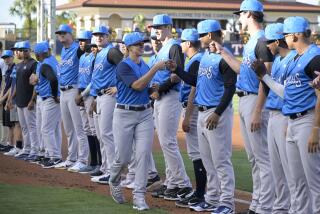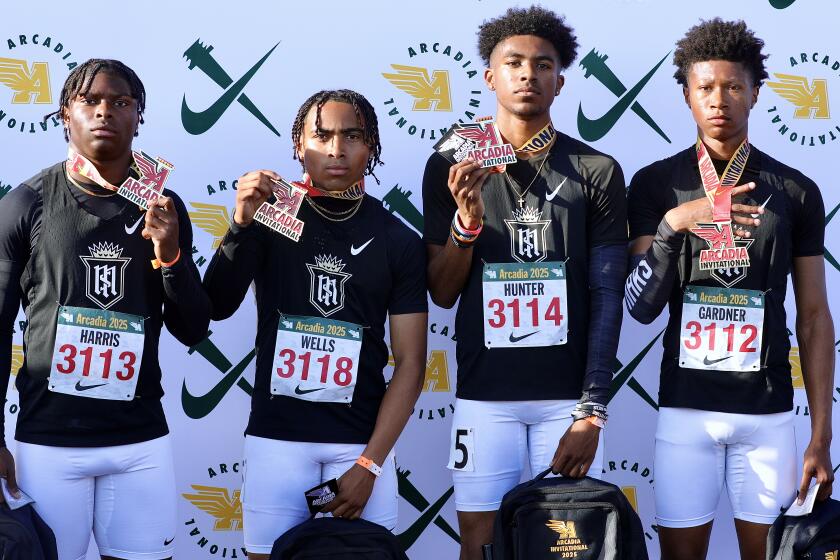Owners Gripe as Baseball Strike Begins
- Share via
NEW YORK — Although some team owners questioned the strategy and direction of their collective-bargaining negotiations, there was no attempt Thursday to avert a strike by major league baseball players.
The sport’s eighth work stoppage in 23 years began after Thursday night’s final contest in Oakland. All games are cancelled; there were no negotiations Thursday, and none are scheduled today.
“The players are resigned and resentful,” said Donald Fehr, executive director of the Major League Baseball Players Assn. “They are resigned that this has to be and resentful that they are forced to do this in an industry that has enjoyed tremendous growth in recent years. They are forced to do this because the owners can’t get their house in order.”
A strike, Fehr said, is the union’s only economic leverage against the likelihood that the owners will eventually declare an impasse and unilaterally implement a new compensation system based on a salary cap.
The union contends that such a limit would restrict salaries, transfer millions of dollars from players to owners, eliminate salary arbitration and destroy free agency.
“Everything the owners have done has been aimed at setting up this confrontation and breaking the union,” Fehr said. “The players have a choice. Take a salary cap now, take it after the season because (the owners) impose it, or strike. The owners have very deliberately left the players with no choices at all.”
Richard Ravitch, the owners’ chief negotiator, said the players’ decision to strike, disrupting one of baseball’s most interesting seasons in years, is a tragedy for millions of fans.
He bemoaned the union’s failure to respond to the salary-cap proposal, which he called central to the game’s economic future because it would help balance revenue disparities between the bigger- and smaller-market clubs.
Ravitch, however, came under fire from some owners Thursday, and there were several phone conferences among the owners, whose divisiveness during previous work stoppages undermined their negotiating efforts.
George Steinbrenner, the often-bellicose owner of the New York Yankees, who are leading the American League’s Eastern Division, criticized Ravitch’s refusal to let owners join negotiators at the bargaining table (an approach the owners had previously approved) and said Ravitch’s argument that a salary cap was needed to achieve competitive balance “didn’t wash.”
He cited the success of the small-market Montreal Expos, who have the best record in baseball this year and the World Series victories by the Minnesota Twins in 1987 and 1991.
Referring to what he said was the need for owners to participate in the bargaining, Steinbrenner told the Philadelphia Inquirer: “We must get people to the table who have considerable financial interest in the game, personal financial interest in the game. Not a bunch of lawyers who are the only ones that are going to make money out of the strike.”
Marge Schott, owner of the Cincinnati Reds, questioned Ravitch’s negotiating experience, and Baltimore Orioles owner Peter Angelos said a personality conflict between Ravitch and Fehr is preventing progress.
Angelos added that the owners should pledge not to implement their salary-cap proposal in return for a no-strike pledge by the union through 1995.
“That’s probably our best shot right now--a quid pro quo,” he said. “There’s no way the issues at hand will be resolved in 24 hours or the next week.”
Jerry Reinsdorf, owner of the Chicago White Sox, dismissed the comments by Steinbrenner and Angelos. “George speaks for himself, and I don’t think many people would agree with him,” Reinsdorf said.
“The problem with Mr. Angelos is he’s new in the game and not fully aware of all the things that have been going on,” he said.
Fehr said it was a little late for no-strike pledges and promises from an ownership that seldom keeps them. He applauded Steinbrenner for his remarks on competitive balance and the need to have owners at the table.
“Someone seems to be finally paying attention on their side,” Fehr said.
In Los Angeles, Peter O’Malley, owner of the Dodgers, said the critical comments from other owners were unfortunate.
“It makes the job tougher for both sides,” he said. “We should all leave the negotiations to those involved.”
Although the owners have a self-imposed gag rule, Ravitch said he and interim commissioner Bud Selig, owner of the Milwaukee Brewers, welcomed dissent. He said 28 owners are never going to agree at all times, but “not one owner has suggested to me or Bud Selig that we should modify our proposal, and I talked to more than half of the owners today.”
“At the same time, I don’t want to mislead you,” he added. “No one likes where we are. We’re all fans and we’re all uncomfortable with this. The owners have big investments. All are going to lose money. No one likes to lose money, but they continue to reaffirm their support of our proposal.”
With the owners and players seemingly polarized--creating the possibility that the final 52 days of the season, along with the playoffs and World Series, could be wiped out--President Clinton said in Washington that Labor Secretary Robert B. Reich continues to be in contact with the factions.
“We have done what we could to make some constructive suggestions,” Clinton said.
Responded Fehr: “We have not even reached the point at which there is a conceptual framework within which we can negotiate a deal. I welcome any help, but I don’t know what Mr. Reich can do right now.”
* BUSINESS IMPACT: How a strike would affect the industry serving baseball. D1
More to Read
Go beyond the scoreboard
Get the latest on L.A.'s teams in the daily Sports Report newsletter.
You may occasionally receive promotional content from the Los Angeles Times.










